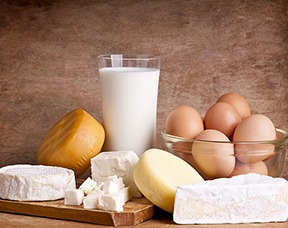NEW YORK, NEW YORK (PRWEB) MARCH 28, 2017
A new study out of Sweden in the International Journal of Cancer is suggesting that men diagnosed with localized prostate cancer should minimize their intake of dairy as it may be an effective method of decreasing prostate cancer progression and mortality.
“This study is very interesting given the fact that prostate cancer is the most common cancer among European men and the third leading cause of death for men in Europe,” said Dr. Samadi.“This study wanted to identify if there were any modifiable factors that could be increasing prostate cancer progression. Past studies have shown an association between men consuming a higher intake of high-fat dairy and aggressive prostate cancer. But this study wanted to look at the impact of dairy intake and the progression of prostate cancer after diagnosis.”
The 20 year study followed a population-based cohort of 525 prostate cancer patients from a case-control study who were younger than 80 years old at the time of enrollment and all born in Sweden. The recruitment of participants occurred from January 1989 and September 1991, and again between May 1992 and July 1994. Researchers provided self-administered questionnaires that covered 16 dairy products looking at the associations between total, high-fat and low-fat dairy, total, high-fat, low-fat, and sour milk, butter, cheese, calcium, phosphorous and vitamin D and prostate cancer progression.
“The researchers went in expecting that men with prostate cancer would have a higher intake of high-fat milk based on previous studies from other research,” explained Dr. Samadi. “The results showed that 490 of the 525 participants died over the course of 20 years of which 222 died from prostate cancer and 268 from other causes. For the 230 men who had localized prostate cancer, a high-fat milk intake was associated with an increased prostate cancer-specific mortality. Also among the men who consumed more than 1 serving of total milk each day, those who drank more high-fat milk than low-fat milk, regardless of the amount, had an association with an increased risk of both prostate cancer specific and mortality.”
At the time of each man’s diagnosis, it was found that on average, patients consumed 5 servings a day of total dairy products. What was found was that whole milk or high-fat milk was not associated with prostate cancer-specific death. But among the patients who were diagnosed with localized prostate cancer, when compared to men who consumed less than 1 serving a day of high-fat milk, those who drank 3 or more servings a day had an increased risk of prostate cancer mortality. Men who drank low-fat milk had an association with a borderline reduction in prostate cancer death among patients with localized prostate cancer.
Another conclusion from the study was that localized prostate cancer is probably more susceptible to a man’s overall lifestyle factors. Therefore, men with localized prostate cancer who consumed low-fat milk are more likely to be considered healthier since low-fat milk consumers are probably practicing other healthy behaviors helping prevent a progression of their prostate cancer.
“I think the main takeaway from this study is that a man’s intake of dairy does appear to have some impact on localized prostate cancer,” stated Dr. Samadi. “It would be advisable and I would support this for all men to switch from high-fat dairy to low-fat dairy versions. This would include not just milk but also yogurt, cottage cheese, and cheese which the dairy industry has made it easy for us to do. Dairy products provide excellent sources of calcium, vitamin D, protein and riboflavin but we need to choose the low-fat options keeping the number of portions minimal at about 2 servings a day.”
Dr. Samadi went on to add, “Since there is such a wide variation in nutritional composition among dairy products, primarily in the fat content, these components could be influencing disease progression differently. Whole milk has about a 40-fold greater saturated fat content compared to skim milk. I believe until there are more studies looking into the identification of which dairy components are responsible for this association, it would be best for any man to drink skim milk and choose other low-fat dairy foods to protect his prostate.”
Patients newly diagnosed with prostate cancer can contact world renowned prostate cancer surgeon and urologic oncologist, Dr. David Samadi, for a free phone consultation and to learn more about prostate cancer risk, call 212-365-5000.


